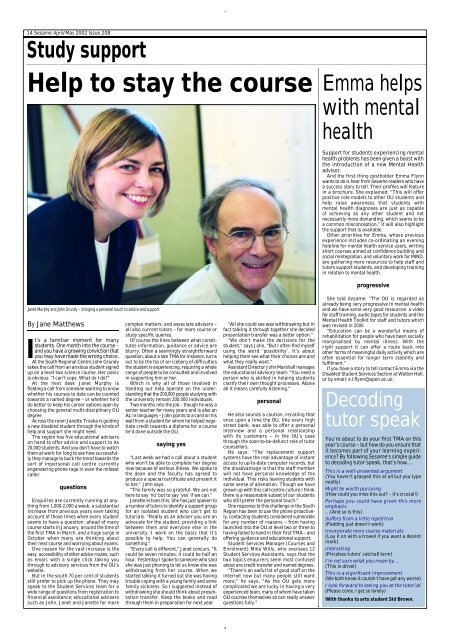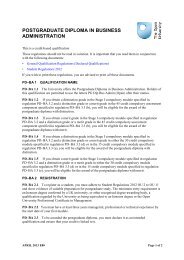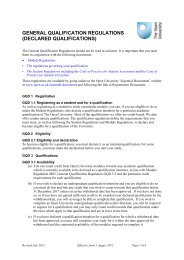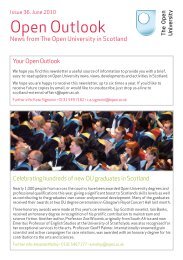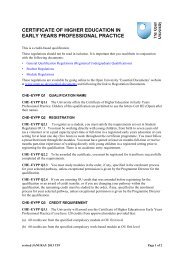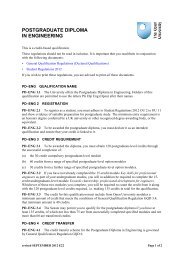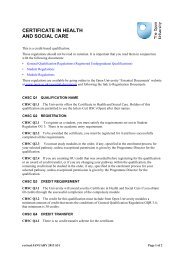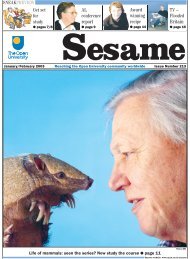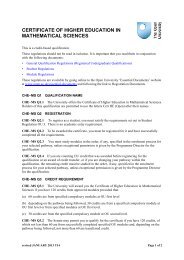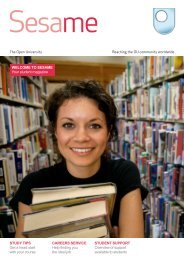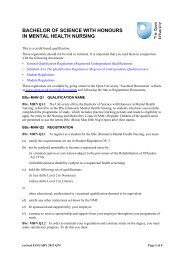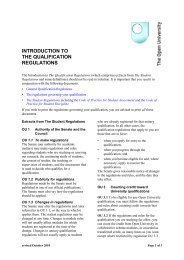14 <strong>Sesame</strong> <strong>April</strong>/<strong>May</strong> <strong>2002</strong> Issue 208Study supportHelp to stay the cours eEmma helpswith mentalh e a l t hJanet Murphy and John Grundy – bringing a personal touch to advice and supportBy Jane MatthewsIt’s a familiar moment for manystudents. One month into the course –and you have a growing conviction thatyou may have made the wrong choice.At the South Regional Centre John Grundytakes the call from an anxious student signedup on a level two science course. Her panicis obvious: “I can’t cope. What do I do?”At the next desk Janet Murphy isfielding a call from someone wanting to knowwhether his courses to date can be countedtowards a named degree – or whether he’ddo better to keep his career options open bychoosing the general multi-disciplinary OUdegree.Across the room Janette Troska is guidinga new disabled student through the kinds ofhelp and support she might need.<strong>The</strong> region has five educational adviserson hand to offer advice and support to its20,000 students. And you don’t have to watchthem at work for long to see how successfullythey manage to buck the trend towards thesort of impersonal call centre currentlyengendering phone rage in even the mildestcaller.questionsEnquiries are currently running at anythingfrom 1,000-2,000 a week, a substantialincrease from previous years even takingaccount of those times when every studentseems to have a question: ahead of manycourse starts in January, around the time ofthe first TMA in March, and a huge surge inOctober when many are thinking abouttheir next course and worrying about exams.One reason for the vast increase is theeasy accessibility of other advice routes, suchas email, with a single click taking youthrough to advisory services from the OU’swebsite.But in the south 70 per cent of studentsstill prefer to pick up the phone. <strong>The</strong>y mayspeak to the Student Services team for awide range of questions from registration tofinancial assistance; educational adviserssuch as John, Janet and Janette for morecomplex matters; and associate advisers –all also current tutors – for more course orstudy specific queries.Of course the lines between what constitutesinformation, guidance or advice areblurry. Often a seemingly straightforwardquestion, about a late TMA for instance, turnsout to be the tip of an iceberg of difficultiesthe student is experiencing, requiring a wholerange of people to be consulted and involvedin supporting him or her.Which is why all of those involved inhanding out help operate on the understandingthat the 200,000 people studying withthe university remain 200,000 individuals.Two months into the job – though he was asenior teacher for many years and is also anAL in languages – John points to a card on hiswall from a student for whom he helped negotiatecredit towards a diploma for a coursehe’d done outside the OU.saying yes“Last week we had a call about a studentwho won’t be able to complete her degreenow because of serious illness. We spoke tothe dean and the faculty has agreed toproduce a special certificate and present itto her,” John says.“<strong>The</strong> family was so grateful. We are nothere to say ‘no’ but to say ‘yes’ if we can.”Janette echoes this. She has just spoken toa number of tutors to identify a support groupfor an isolated student who can’t get totutorials. “Really as an adviser you are anadvocate for the student, providing a linkbetween them and everyone else in theuniversity. I work on the basis that it’spossible to help. You can generally dos o m e t h i n g . ”“Every call is different,” Janet concurs. “Itcould be seven minutes, it could be half anhour. Yesterday I spoke to someone who saidshe was just phoning to let us know she waswithdrawing from her course. When westarted talking it turned out she was havingtrouble coping with a young family and somefamily sickness. So I suggested instead ofwithdrawing she should think about presentationtransfer. Keep the books and readthrough them in preparation for next year.“All she could see was withdrawing but infact talking it through together she decidedpresentation transfer was a better option.”“We don’t make the decisions for thestudent,” says John, “But I often find myselfusing the word ‘possibility’. It’s abouthelping them see what their choices are andwhat they really want.”Assistant Director John Marshall managesthe educational advisory team: “You need aperson who is skilled in helping studentsclarify their own thought processes. Aboveall it means carefully listening.”personalHe also sounds a caution, recalling thatonce upon a time the OU, like every highstreet bank, was able to offer a personalinterview and a personal relationshipwith its customers – in the OU’s casethrough the soon-to-be-defunct role of tutorcounsellors.He says: “<strong>The</strong> replacement supportsystems have the real advantage of instantaccess to up-to-date computer records, butthe disadvantage is that the staff memberwill not have personal knowledge of theindividual. This risks leaving students withsome sense of alienation. Though we havegrown up with this call-centre culture I thinkthere is a reasonable subset of our studentswho still prefer the personal touch.”One response to this challenge in the SouthRegion has been to use the phone proactively,contacting students considered vulnerablefor any number of reasons – from havinglaunched into the OU at level two or three tohaving failed to hand in their first TMA – andoffering guidance and educational support.Student Services Manager (Courses andEnrolment) Mike Wills, who oversees 12Student Services Assistants, says that thetwo topics enquirers seem most confusedabout are credit transfer and named degrees.“<strong>The</strong>re’s an awful lot of good stuff on theinternet now but many people still wantmore,” he says. “As the OU gets morecomplicated we are lucky in having a veryexperienced team, many of whom have takenOU courses themselves so can really answerquestions fully.”Support for students experiencing mentalhealth problems has been given a boost withthe introduction of a new Mental Healthadvisor.And the first thing postholder Emma Flynnwants to do is hear from S e s a m ereaders who havea success story to tell. <strong>The</strong>ir profiles will featurein a brochure. She explained: “This will offerpositive role models to other OU students andhelp raise awareness that students withmental health diagnoses are just as capableof achieving as any other student and notnecessarily more demanding, which seems to bea common misconception.” It will also highlightthe support that is available.Other priorities for Emma, whose previousexperience includes co-ordinating an eveninghelpline for mental health service users, writingshort courses aimed at confidence building andsocial reintegration, and voluntary work for MIND,are gathering more resources to help staff andtutors support students, and developing trainingin relation to mental health.progressiveShe told S e s a m e: “<strong>The</strong> OU is regarded asalready being very progressive in mental healthand we have some very good resources: a videofor staff training, audio tapes for students and theMental Health Toolkit for staff and tutors whichwas revised in 2000.“Education can be a wonderful means ofrehabilitation for people who have been sociallymarginalised by mental illness. With theright support it can offer a route back intoother forms of meaningful daily activity which areoften essential for longer term stability andfulfilment.”If you have a story to tell contact Emma via theDisabled Student Services Section at Walton Hall,or by email: e.l.flynn@open.ac.uk .D e c o d i n gtutor speakYou’re about to do your first TMA on thisyear’s course – but how do you ensure thatit becomes part of your learning experience?By following S e s a m e’s simple guideto decoding tutor speak, that’s how….This is a well-presented argument(You haven’t grasped this at all but you typeneatly)Might be worth pursuing(How could you miss this out? – it’s crucial!)Perhaps you could have given this moreemphasis…(And so is this)Suffers from a little repetition(Padding just doesn’t work)Incorporate more course materials(Lay it on with a trowel if you want a decentmark)Interesting(Priceless tutors’ catchall term)I’m not sure what you mean by…(This is drivel)This is a significant improvement(We both know it couldn’t have got any worse)I look forward to seeing you at the tutorial(Please come, I get so lonely)With thanks to arts student Sid Brown.
Suspicion of the nuclear industry has been a fact of lifesince the mushroom clouds seared their way deep intopublic consciousness. Half a century on, fear of whatterrorists might do next, and the huge row over Sellafie l d ,mean the debate is generating as much heat and fury as ever.<strong>The</strong> OU’s Ray Mackintosh experienced this at firsthand when theBBC invited him to comment on a journalist’s suggestion that the trickmight be to ‘rebrand’ nuclear physics with a new name.Recalls Ray: “<strong>The</strong> producer assured me that Brian Hanrahan, whowould interview me, was a ‘sweetie’… I was told that the interviewwould be introduced by some visual images. Those images turned outto be, of course, film of the Hiroshima mushroom cloud. <strong>The</strong>y werefollowed by the ‘sweetie’ saying with great emphasis: ‘You do have aproblem don’t you’.”<strong>The</strong> international community of nuclear physicists rejected therebranding idea but did agree on the urgent need for a public educationcampaign. <strong>The</strong>y drew up a programme which would include atravelling exhibition, where local nuclear physicists and the publiccould meet; a website featuring educational material for the public andteachers; and a popular book.It is the last of these which Ray, Senior Lecturer in the Science Faculty,has been most closely involved with – and which has just resulted inthe publication of the beautifully produced Nucleus: a trip into theheart of the matter (Canopus 2001).Seeing beyo n dthe bombNucleus: a trip into the heart of the matter,Canopus/Johns Hopkins <strong>University</strong> Press,price £14.95Its aim, which is to ‘bring the wonders of nuclear physics to a broadaudience’, carries no hint of irony. In every lavishly illustrated page,every fascinating aside (did you know, for instance, that there are moreatoms in a single glass of water than there are glasses of water in allthe earth’s oceans) the book demonstrates the central role of nuclearphysics in our exploration of nature.Says Ray: “That people associate us wholly with some of thesinister applications is something we live with. I know hundreds ofnuclear physicists and only one of those has ever had anything to dowith nuclear power. This is a campaign to explain to the public whatit really is. <strong>The</strong> implicit message beneath all of the text is that nuclearphysics is about nothing more sinister than understanding theuniverse.”<strong>The</strong> book demonstrates that without nuclear physics we simply couldnot understand the processes by which some elements were made inthe Big Bang, and the rest made in exploding stars. Nuclear physicstells us why there is more iron than gold in the world.<strong>The</strong>n there is its crucial contribution to areas such as medicine. Indirect contrast to its image as bringer of destruction, each day in theUS alone some 47,000 medical operations – many of them life-saving– would not happen but for nuclear physics.Says Ray: “<strong>The</strong> spin-offs in medicine are much more important thanpeople realise, yet a 50-year old spin-off known as nuclear bombs arethe only things the public associates with the subject.“It is as if the only thing people know about chemists is that theyinvented TNT and mustard gas.”Ray’s experience producing OU courses played a fundamental rolein working with three international nuclear physicists to write and producea book aimed at a generalist audience, particularly the schoolsmarket. <strong>The</strong> book has been adopted by Johns Hopkins <strong>University</strong> Pressin the US which should ensure its financial viability: at £14.95 the UKedition is priced to sell rather than to return any royalties.Despite this success, he is realistic about the contribution the bookmay make to nudging public understanding of his branch of science alittle further forward. “A single book is not going to change public attitudesbut you never know who is going to read it. What we have done isset down a marker to show nuclear physics is a central part of our understandingof the physical world. In the time I have been working in scienceit has changed very much from being an interesting specialisationto the point where suddenly all of physics becomes connected.”Reviewed by Jane MatthewsIssue 208 <strong>April</strong>/<strong>May</strong> <strong>2002</strong> <strong>Sesame</strong> 15BooksG e t t i n gthat jobHandling Tough Job InterviewsHow To Books, price £8.99.Julie-Ann Amos is a human resourcesconsultant who has doubtless seenenough employment hopefuls sitbefore her to know exactly what she istalking about. It makes her eminentlyq u a l i fied to take the reader through everysingle stage of a recruitment process – inenormous detail.<strong>The</strong> book gives a wealth of sound advice,including good hints on how to make theright impression, the best questions to ask,how to approach negotiating a salary, takinga psychometric test and how you should treata regular interview differently from one witha recruitment agency or a head-hunter.But perhaps she should have stopped there.Few people, after all, could fill 119 pageson how to prepare for an interview, but MsAmos manages it with a welter of additionaladvice which perhaps would be better placedunder the heading Patronising Tips For <strong>The</strong>Unutterably Stupid.<strong>The</strong>se serious suggestions include: makingsure your zips are done up; avoidingtalking with a mouth full of biscuit; and – I’mnot making this up – not turning up for theinterview while on drugs.<strong>The</strong>re’s also a section that seems designedto help transform the self-assured intervieweeinto a gibbering bag of nerves. It lists thethings you can expect to do during the first 30seconds – “knocking on the door; seeing theinterviewer for the first time; walking in;saying hello; shaking hands; taking off a coat;sitting down; accepting or declining a drink.Wow! A lot goes on, doesn’t it?”.<strong>The</strong> Inte rnet Job search HandbookHow To Books, price £9.99.K n owing your bodles fro myour baw b e e s<strong>The</strong> Collins Dictionary of Scottish History, by Ian Donnachie and GeorgeHewitt. Harper Collins, ISBN 0 00 712 1857, price £19.99Afamous Scottish statesman onceremarked: “History doesn’t repeatitself. Historians repeat each other.”Although obviously intended as a bon mot,there is more than an element of truth in theassertion. It is therefore refreshing to comeacross a history book that relies heavily onrecent research and the considerableexpertise of its authors. <strong>The</strong> o n g o i n gcollaboration between <strong>Open</strong> <strong>University</strong>lecturers Ian Donnachie and GeorgeHewitt has resulted in a valuable additionto the catalogue of Scottish historicalreference material.<strong>The</strong> Collins Dictionary of Scottish Historyis a wide-ranging, single volume work coveringmajor personalities, important events andkey themes from Scotland’s past. <strong>The</strong> alphabeticalarrangement of the dictionary offersquick access to entries and chain referencingbetween related topics. Many interesting andwell-written biographical notes are included.Social historians will also find much to interestthem. In addition to recording the peopleand events of great historical significance,there are entries for everyday activities.Traditional trades and occupations such asfishing and textile manufacture are recordedalong with great industries like shipbuilding.Informative appendices provide outline maps,population statistics, royal family treesand other useful data. <strong>The</strong> appendix of‘Scots Weights, Measures and Money’ offers acharming glimpse of some archaic unitary terms.If you need to know how many ‘mutchkins’ thereare in a ‘chopin’ or how many ‘bodles’ in a‘bawbee’ you will find the answer here.<strong>The</strong> criteria adopted by the authors for theinclusion of dictionary entries were ‘relativehistorical importance and the findings of recentresearch’. <strong>The</strong>se are, to some extent, subjectivecriteria and not everyone will concur fullywith their selection or the degree of emphasisplaced on particular subjects. One may wonder,for example, why ‘immigration’ (albeit afascinating subject) should be allocated eightpages while ‘emigration’ commands only a coupleof columns. <strong>The</strong> Scottish diaspora mustsurely be a major topic of worldwide interest.However, this apparent disparity in no waydetracts from the book’s importance as a solidand reliable work of reference. A volume ofthis size cannot, and does not, claim to be comprehensive.But there is ample coverage ofmost major themes. <strong>The</strong> much-studied ‘Enlightenment’period and its associated luminariesreceive the attention they deserve, and studentsof Scotland’s more recent history willfind the volume a particularly appropriatevade-mecum. Although the occasional entrymay be less than generous in its scope, thereare useful bibliographical references and linksto alternative entries and other sources.Future editions would benefit from the inclusionof an index, as chain-referencing alonecan be a somewhat long-winded method ofarriving at the required information.<strong>The</strong> Collins Dictionary of Scottish Historywill undoubtedly prove an invaluable referenceasset to all students of Scottish historyand is highly recommended.Reviewed by Roy HendersonYou can’t blame the authors of T h eInternet Job Search Handbook f o rthinking such a tome would be a goodidea. It’s a big world out there and, if youwant specific information, you’re goingto need all the help you can get.Andrea Semple and Matt Haig’s 200 pagesof friendly, well set-out advice does go someway to assisting job-seekers through the mire.For example, the book provides usefulpointers about preparing an online cv,choosing a trustworthy recruitment site,making use of the best search engines and, inshort, helping the reader to make specific,relevant applications for specific, relevant jobsthrough specific, relevant sites.I would hazard a guess that those who willbenefit most from this work are people whohaven’t applied for a job in a while. This bookincludes sites which encourage you to fill outforms to see the type of work to which you maybe suited, which struck me as strange –whathappened to applying for a job that wouldactually interest you?For all its strengths, the main drawbackwith this book, or any like it, is that, with thebest advice and will in the world, the internetwill always be so unwieldy and untidy that themost straightforward of queries can still beimpossible to answer.Which means that while the book assertsproudly that “more than 50 per cent ofjobseekers have looked for a job online”, itdoesn’t mean they found one. I tried at leastfive top-rated UK-based job sites and was toldmy field of interest, journalism, “returned nomatches”.Reviews by James MilldaleTitles can be ordered online fromAmazon through the OU’s bookshop:w w w . o p e n l i n k . o r g. Every purchase madevia this site creates a contribution to theOU Foundation.


